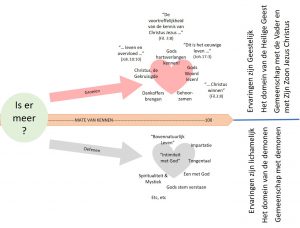Some time ago, at a Bible study conference, a text came up that had a certain term that stuck with me. It was the expression 'know the Lord' from Hebrews 8:11
“And they shall by no means teach every man his neighbor and every man his brother, saying, Ken the Lord. For they will know, from small to large among them” (Hebrews 8:11).
It was the reason to ask myself what that actually means: 'know the Lord'?
From zero to one hundred
'Knowing' someone else ranges from very superficial to very intimate; it's a scale from 0 to 100 you could say. So if we ask the question, "Do you know the Lord?" then it is not immediately clear what we mean by that. In the first instance, of course, we simply think of what you know about Him; Who He is, what He has done. Facts, so to speak. Just as the king knows of this land and knows things about him. He may even have shaken your hand on King's Day. Or maybe you know someone who got you out of the pond you got into as a small child long ago. You know the circumstances your parents told you and you know a few things about your savior. You may even still have grateful feelings for him, even if you have lost sight of him.

You could think of this as the 'knowing' on the left side of the scale. On the right is another way of knowing. That is the conscious inner knowing, which goes a few strokes deeper, is personal, has to do with a relationship and with your inner self.
What are we going to talk about?
We are not going to give an overview here of all the texts where 'know' occurs and the Greek and Hebrew words and what their precise meaning is. The whole breadth of 'knowing' occurs in the Bible and is often also represented by the same (Greek or Hebrew) word. So it's all quite mixed up, if I understand it a bit. Just like in our world and in our own lives.
There is undoubtedly much, much more to be said on the subject, but we will limit ourselves. Figuring out everything takes too much time and is perhaps even impossible for a limited person like me. But what I do want to try is to mention a few things that I believe are important to the practice of the life of faith.
Knowing God: Eternal Life
The Pharisees would not accept the Lord Jesus, not believe in Him. They would not believe that He was sent by God His Father. The Lord Jesus then says “you do not know Me nor My Father; If you knew Me, you would also know My Father” (John 8:19). But you cannot know Him until you first believe in Him and receive Him as God sent, who came to save sinners. This is how knowing begins. The Lord Jesus says to the Father:For the words which You gave Me I have given them, and they have received them, and they have indeed acknowledged that I came out of You, and believed that You sent Me.(John 17:8). The first step of knowing is believing in Him.
But if you turn to God and accept the Lord Jesus as the One who, sent by God, died for your sins on Calvary's cross, He will give you eternal life, as He Himself says in His prayer to the Father (cf. see John 17:2). And immediately afterwards He defines what that eternal life is: know God!
“And this is eternal life, that they know you, the only true God, and Jesus Christ, whom You have sent” (John 17:3)
It is both at the same time: to know God the Father and His Son Jesus Christ, who was sent from heaven to save sinners. That is the true Christian life as it is meant to be: to know the only true God and Jesus Christ whom He has sent.
To what extent do you know God and the Lord Jesus?
The question still remains what 'knowing' means now. To begin with, you could ask how much you know Him (or Them), much or little?

If you would know a lot about God the Father and about the Lord Jesus and you know a lot of Bible texts that go with it or maybe you know entire Bible passages by heart, then it will remain mainly somewhere on the left. Then you know a lot of things about God, but you're still on the left. Memorizing any more just adds facts and doesn't take you further to the right.
You probably notice in yourself the dissatisfied feeling that there must be more. But the question then is how you can get to know God in such a way that it is not just a matter of facts and knowledge, but that it goes deeper. You want to know that different way. The conscious inner knowing, which goes a few beats deeper, is personal, has to do with a relationship and with your heart.

So that I may know Him
Paul was also aware of this 'longing for more' and says that he puts everything aside and considers it damage and dung when it comes to his striving to know Christ.
“(…) because of the excellence of the knowledge of Christ Jesus, my Lord, because of whom I have experienced all this as loss. And I count it as filth, that I may gain Christ . . . that I may know him (…)” (Philippians 3:8-10)
If you read through this section for a moment, it turns out that Paul doesn't think he's done with it yet, but that he's staying”hunt to grab it” (verse 12). It is and remains his constant pursuit to get to know the Lord Jesus Christ more and more. The knowledge of Christ Jesus his Lord is so excellent, and so far above all, that he will continue to hunt for it and give up everything for it.
Knowing the real
Yet we still do not have an answer to the question of what 'the real knowing' is now, but we can go further in the book of the prophet Hosea. Hosea is about the relationship of the Lord with His people Israel with descriptions of the highs and lows. Very useful to read a few times and let it sink in, because it also has a lot to say for Christians today. After all, they are things that happened to Israel and according to Paul are examples and warnings for us (1 Corinthians 10:11).
Two things in the book of Hosea stand out. First, that the Lord's relationship with His people is seen as that of man and woman. In addition, it is striking how often the word 'know' or 'knowledge' is mentioned. Both come together in the next verse
“In faithfulness I will take you for My bride; and you will know the Lord” (Hosea 2:19).
The greatest and highest knowledge is therefore that between man and woman. It is the most intimate knowledge there is, and the Lord likens that to knowing Him. So it has not to do with the sexuality between man and woman, but with the fact that marriage partners (or betrothed) know each other's heart and thus each other's heart's desire and desire to fulfill it.
So we must conclude that
'Knowing the Lord' means that I know the desires of His heart and that I long for His heart's desire to be fulfilled.
God's heart's desire
That's quite a subject for me: 'God's heart's desire'! I suspect this is a topic you never get over. Let alone that you can put some things on paper in an orderly manner. And that you would be only somewhat complete in that, seems to me an illusion. I'm not going to try it (yet?). It seems to me a wonderful question for every time we read the Bible to also ask this question: "what is the heart's desire of God here?"
Yet there is one theme that I dare say is the first to be referred to as 'God's heart's desire'. That's the one topic of this site:
Serving God by thanking and honoring Him for the gift of His Son, thanking the Lord Jesus Christ and the Lord Jesus for His coming to this earth and His atoning work on the cross of Calvary.
Praise and thanksgiving is something every believer can do on a daily basis. We have already written more about that (for example here and here). Moreover, this is the most beautiful thing we can do for the Lord together with other believers: honor Him and offer sacrifices of praise and thanksgiving (see here).
The Word and obedience
What is in the heart of the Lord, what His desires are, we only get to know when we read the Bible. To get to know the Lord Jesus better, it is necessary to read God's Word. We cannot grow in knowing Him if we are not constantly reading the Bible. We read the Bible not because we have to, but because we love God's Word. As the Psalmist puts it:
“I rejoice in Your commandments, which I love. I lift up my hands to Your commandments, which I love, and meditate on Your ordinances” (Psalm 119:47,48).
But when the Word teaches us something about God's heart and His desire, it is only natural that we want to fulfill that desire of His. Simply put: obey. Not because we have to, but because we love Him. “We love Him because He first loved us” (1 John 4:19)
About this obedience John tells us:
“And by this we know that we know Him, that is, if we keep His commandments.
Whoever says, I know Him, and does not keep His commandments, is a liar, and the truth is not in him” (1 John 2:3,4).
Moreover, it is God's desire that all believers grow in knowing Him and that it is not limited to just a few. So that they also grow together as the body of Christ. Paul describes it this way:
“And he has given some as apostles, some as prophets, some as evangelists, and still others as pastors and teachers, to equip the saints, until . . . the knowledge of the Son of God, . . . that by holding ourselves in love to the truth, we should add in all things grow to Him Who is the Head, even Christ.
From Him the whole body is joined and held together by each band of support, according to the measure of each part's activity. Thus the body acquires its growth, to build itself up in love” (Ephesians 4:11-16).
A picture in between
We have seen that 'knowing the Lord' means more than just knowing what is necessary about Him. It mainly means that we know His heart and what the desires of His heart are. Then, of course, we also want to meet those desires. Call that obedience. And then I added love in the picture because none of this would happen without 'the love of God, which was poured out in our hearts by the Holy Spirit' (Romans 5:5). In the quote from Ephesians 4 quoted above, Paul mentions that we 'hold us in love to the truth'.

Keep in mind that a picture can simplify things somewhat and in that sense can help to understand something, but on the other hand a picture is much less rich and complete than the Word of God itself. Only the Word of God is'alive and strong' (Hebrews 4:12).
When we extend this to the picture of 'knowing the Lord', then the above shown knowledge, the real knowing is on the right of the arrow. The 'desire for more' must therefore be filled in with the things we have discovered here as belonging to the 'true knowing of the Lord'. Moreover, you can add some things that have to do with the real spiritual life of the believer. Then you end up with a picture like this, for example.

Marriage
Then we still have to go back to the man-woman relationship, as we mentioned above in the text from Hosea. In the Bible you will find several passages that deal with the relationship of man and woman in marriage. In the Old Testament the people of Israel are seen as the wife of God and in the New Testament the Church is presented as the Bride of Christ. Those images are not used for nothing, because they say something about the depth of knowing each other. A unique relationship in which man and woman know each other like no other. There is no deeper unity.
Perhaps we realize too little what marriage is really about. Getting to know the heart and the heart's desire of the other and wanting to meet them. Undoubtedly, that aspect is addressed when it says “And Adam had intercourse with Eve his wife” (Genesis 4:1). Actually it says here “Adam knew Eve his wife”[1] and that is wonderful, because it means that Adam knew the heart of Eve. He was focused on the other. How very different it is today with sexuality, which is usually mainly focused on one's own self and one's own pleasure[2] and thus on one's own physical experiences. In this way the real 'knowing' of the other disappears from the picture.
In Ephesians 5 from verse 22 Paul writes about the relationship between man and woman in marriage. A special part that we will not go into here. But at the end of this section he talks about the secret of marriage and says "This mystery is great; but I speak this in view of Christ and the church” (Ephesians 5:32).
Hosea
In the book of Hosea we also find the picture of marriage (of Hosea and his wife Gomer) as a picture of the relationship of the Lord God with His people Israel. In Gomer and her children we find images of the people of Israel, who have become unfaithful to the Lord, her 'husband'. Without going through the whole book now[3], anyway a few things out related to our topic.
Know the Lord
“Knowing the Lord” is an important theme in Hosea. The word for 'know' or 'knowledge' occurs more than 10 times in this context[4]. It is clearly the Lord's intent for His people to know Him, but if you read through the book, it will become clear that they stray from Him and fall into idolatry. They serve the Baalim (2:7,12), without realizing it because at one point they say to the Lord:My God! We, Israel, know You!” (8:2). But they no longer know Him who has given them all the blessings (2:7). They think they still serve the Lord because they still offer sacrifices and incense (e.g. 2:12; 4:13; 8:13), but their sacrifices'will not please Him' (9:4). Nor can they distinguish between Baal and the Lord (2:15; 11:7)
The knowledge disappears
One of the causes of falling into idolatry is mentioned in chapter 4: there is no 'knowledge of God' more (4:1). And verse 6 says:My people are exterminated because they are without knowledge”. The people themselves are responsible for this, but the priests, prophets and princes (say the leaders) are also specifically addressed. The priests, as those who knew how to serve God and to lead the people in it, have failed (4:6,9; 6:9). The prophets who were to pass on the words of God stumbled with the people (4:5). The princes are only interested in their own gain (4:18) and have no regard for the boundaries that the Lord has set (5:10). God's Word had nothing more to say to them:Though I write for them My law ten thousandfold, yet it is regarded as a strange thing” (8:12).
Judgment and Recovery
The chapters of Hosea make it clear that the condition of the people calls for the judgment of God. Read them on. Whatever the people do to the Lord will be recompensed to them. God's wrath is great and fierce. Yet it is also true that a call to repentance is being made and that part of the people will respond to this. Those are the ones the Lord goes on with because they repent. We see this perspective throughout the book. In the last chapter it ends with the call:
“. . . turn to the Lord. Say to Him, Take away all iniquity, take what is good. Then we will fulfill the sacrifices of our lips” (Hosea 14:3).
Wonderful to see that the Lord is not concerned with the sacrifices in themselves, but with the praise and thanksgiving of their lips, which rises from the heart. That is the heart's desire of the Lord!
Idolatry and fornication[5]
In the book of Hosea, as in other places in Scripture, idolatry is viewed as fornication and adultery, especially in the first few chapters. Idolatry is often accompanied by fornication and adultery, just think of temple prostitution that also occurred in Israel, for example, with the sons of Eli (see also Hosea 4:14). But in addition, idolatry itself is often referred to by the words fornication or adultery (for example, Hosea 9:1). So when we come across the word 'fornication' it can literally refer to sexually lewd behavior, but it can also refer to idolatry. The context should make clear what is meant (sometimes both).
The reason that idolatry is often referred to as fornication/adultery, in my opinion, is the following. The Lord wanted a relationship with His people in which they would know Him as 'her Husband' (Hosea 2:15). That would be a spiritual relationship in which the hearts of the people would turn to the Lord and they would serve Him as He pleased. It was a spiritual relationship, in which faith in and obedience to Him had an important place.
But it was a relationship so very different from the relationship the pagans had with their gods. Because they could experience their gods physically. When they approached their gods in the right way, they could physically perceive communion with the gods. Fantastic physical experiences were the result.
This brings us to the distinguishing point:
communion with the Lord God is a cleric communion ('knowing the Lord') and communion with the gods[6] is a physical experienced.
That is also what one is looking for: physical experiences of the supernatural. What Paul calls: "sensual pleasure lovers' (2 Timothy 3:4). That is why idolatry is also called fornication/adultery, since the similarity between the two is that one pursues the bodily ecstatic experiences.
Is there more? Intimacy with God
When Christians feel that their own life of faith is just a substandard, dull affair, many wonder if there isn't more than this. The answer is offered to them from all sides: of course there is, you just have to discover it and open yourself to it. You can learn 'Intimacy with God' and it is fantastic.
It is striking how often you come across this expression these days. It is taught and practiced everywhere in charismatic circles. But the expression conveys exactly what it is all about: “physical ecstasy with the gods”. That is what the Bible calls idolatry or spiritual fornication.

Unfortunately, most of Christendom – just like the nation of Israel at the time – is in the lower part of the picture. In the darkness of idolatry. Without them even realizing it. "God, we know you, don't we?" Many are enthusiastic about "their faith" and their "experiences with God" and are eager to get others to do the same. Satan masquerades as an angel of light 2 Corinthians 11:13,14)
The real answer to the question of whether there is no more lies in the expression “know the Lord”. Know what God has done for you in Christ, love His Word, know His heart's desire, and offer Him daily offerings of praise and thanks. Christ the Crucified at the center of our hearts and lives. He is the one with whom we will soon spend eternity!
“For I have given you in marriage to one man, to present you as a chaste virgin to Christ” (2 Corinthians 11:2).
Then we can also sing Him a 'love song' like for example nr. 132 from Spiritual Songs:
Dear Jesus, to know you
is worth more to me than anything;
to get used to your ways
only gives me peace on earth'.
Everything has lost its shine:
wealth, power and fame and honour.
You chose me first
I want nothing more besides you.
If I may behold Your beauty,
You are brought near to me,
You fill me with firm confidence
by Thy great power of love,
then everything must disappear
compared to that treasure,
then everything must seem vain
what is beautiful in the world.
Yes, it is most desirable
everything I find in you!
Faithful Jesus, it is so wonderful,
To know you as my friend.
Everything to say to you
– for You listen, know my struggle –
to present my concerns to you,
that gives peace and security.
[1] See footnote NIV to this text in Genesis 4:1.
[2] 'Lovers of themselves' and 'lovers of sensual pleasure' are characteristics of mankind in our day (see 2 Timothy 3:2,3)
[3] For example, you can do that yourself here: https://kingcomments.com/nl/bijbel/Hs/Inleiding.
[4] For example 2:7,19; 5:3,4; 4:1.6; 6:3.6; 8:2; 13:4; 14:10
[5] Also see http://www.oudesporen.nl/Download/OS1665.pdf
[6][6] Or: demons



